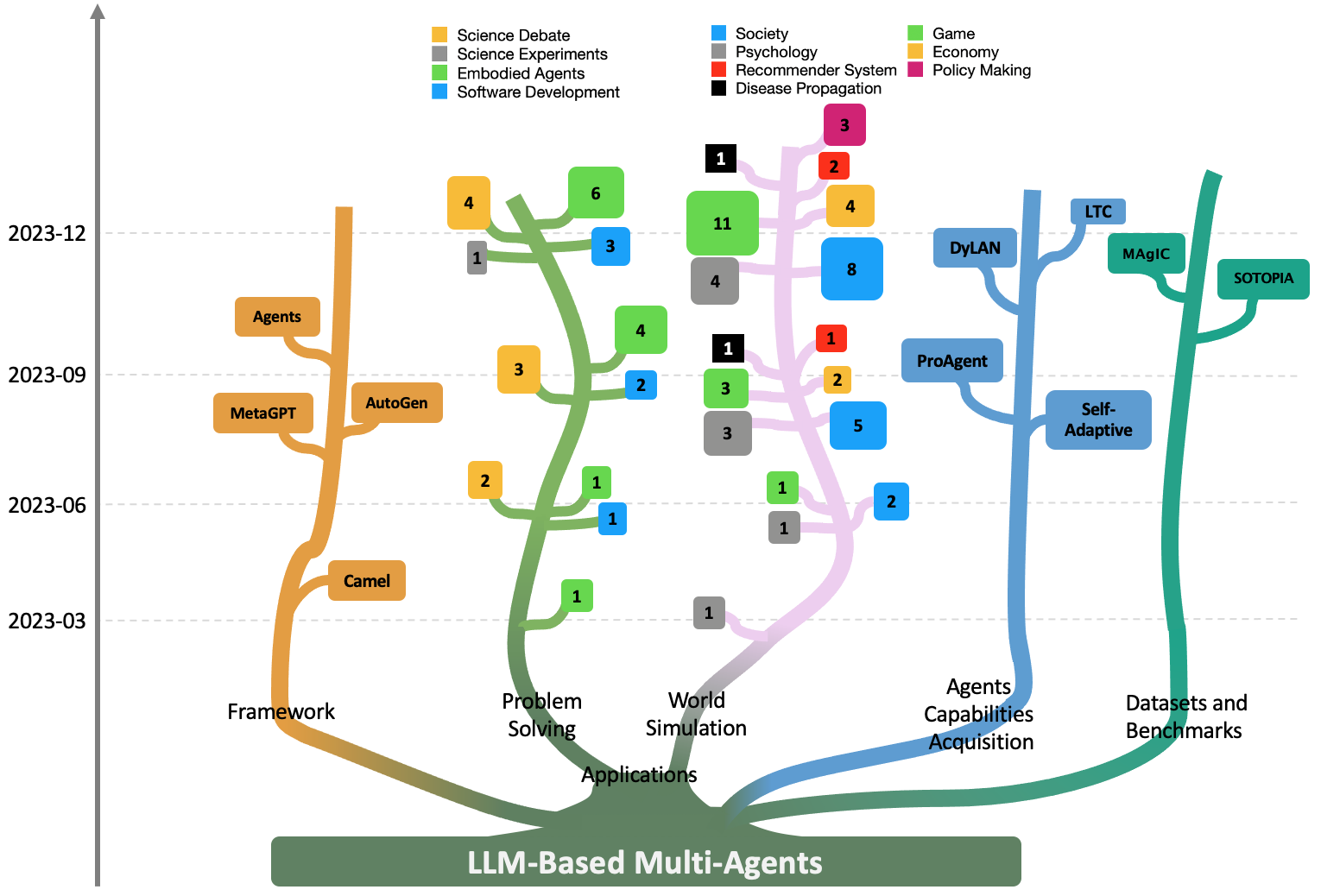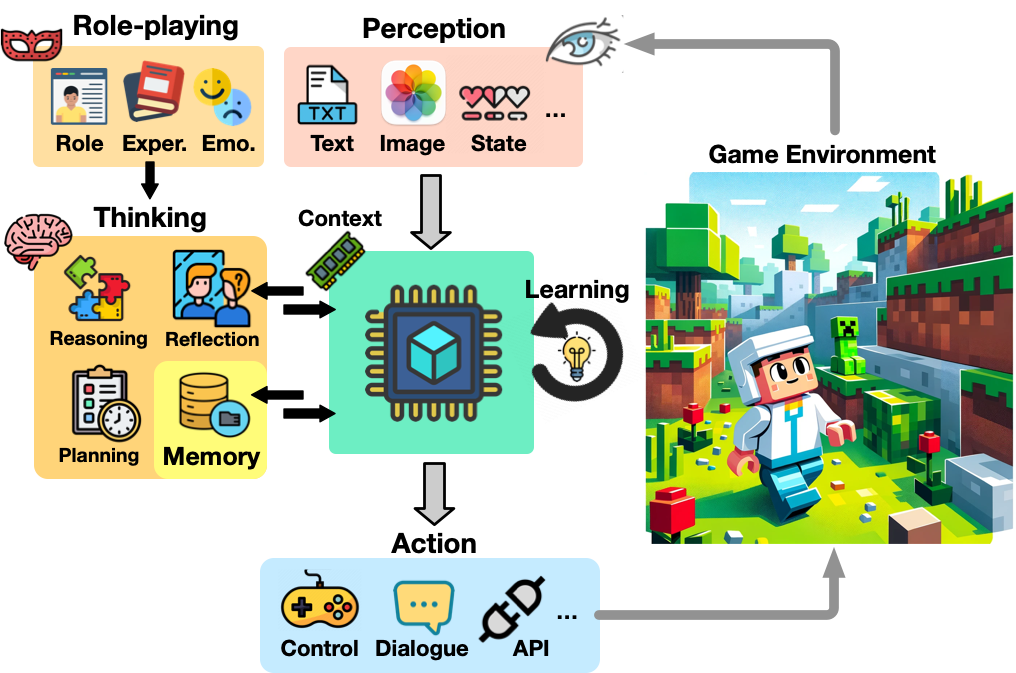Large Language Model based Multi-Agents: A Survey of Progress and Challenges
2402.01680

0
0

Abstract
Large Language Models (LLMs) have achieved remarkable success across a wide array of tasks. Due to the impressive planning and reasoning abilities of LLMs, they have been used as autonomous agents to do many tasks automatically. Recently, based on the development of using one LLM as a single planning or decision-making agent, LLM-based multi-agent systems have achieved considerable progress in complex problem-solving and world simulation. To provide the community with an overview of this dynamic field, we present this survey to offer an in-depth discussion on the essential aspects of multi-agent systems based on LLMs, as well as the challenges. Our goal is for readers to gain substantial insights on the following questions: What domains and environments do LLM-based multi-agents simulate? How are these agents profiled and how do they communicate? What mechanisms contribute to the growth of agents' capacities? For those interested in delving into this field of study, we also summarize the commonly used datasets or benchmarks for them to have convenient access. To keep researchers updated on the latest studies, we maintain an open-source GitHub repository, dedicated to outlining the research on LLM-based multi-agent systems.
Get summaries of the top AI research delivered straight to your inbox:
Overview
- This paper provides a comprehensive survey of the progress and challenges in developing large language model (LLM)-based multi-agent systems.
- It covers the key developments, applications, and open problems in this rapidly evolving field.
- The survey examines the use of LLMs to power single-agent systems as well as more complex multi-agent environments.
Plain English Explanation
Large language models (LLMs) are powerful AI systems that can understand and generate human-like text. Recent years have seen a surge of interest in using LLMs to create intelligent software agents that can collaborate and interact with each other, known as multi-agent systems.
This paper reviews the current state of research in this area, highlighting the significant progress that has been made as well as the ongoing challenges. It explores how LLMs are being used to power single-agent systems, such as digital assistants, and how these capabilities are being extended to enable more sophisticated multi-agent scenarios, like virtual game worlds or educational environments.
The paper delves into the technical details of how LLMs are integrated into multi-agent architectures, the types of tasks and environments they are being applied to, and the unique opportunities and obstacles that arise when multiple LLM-powered agents interact. It also discusses the potential societal impacts of these developments, such as in areas like education.
Overall, this survey provides a comprehensive look at the state of the art in LLM-based multi-agent systems, serving as a valuable resource for researchers, developers, and anyone interested in the cutting edge of AI-powered collaboration and autonomy.
Technical Explanation
The paper begins by providing background on the use of LLMs in single-agent systems, such as digital assistants and chatbots. It then delves into how these capabilities are being extended to multi-agent environments, where multiple LLM-powered agents interact and collaborate.
The authors discuss the various architectural approaches for integrating LLMs into multi-agent systems, including techniques like federated learning and decentralized decision-making. They also explore the types of tasks and environments that LLM-based multi-agent systems are being applied to, such as complex games and simulations as well as educational and training scenarios.
The paper highlights the unique challenges that arise when multiple LLM-powered agents must coordinate and communicate, such as ensuring coherent and consistent behavior, managing conflicting goals, and maintaining ethical and safe interactions. It also discusses the potential for using LLMs to enhance the mathematical reasoning and problem-solving capabilities of multi-agent systems.
Throughout the survey, the authors draw insights from the latest research, covering a wide range of applications and use cases for LLM-based multi-agent systems. They also identify areas for future work, such as improving the interpretability and transparency of these systems, and exploring the societal implications of their widespread adoption.
Critical Analysis
The paper provides a thorough and well-researched overview of the current state of LLM-based multi-agent systems, highlighting both the significant progress that has been made as well as the ongoing challenges. The authors do a commendable job of covering a broad range of topics and applications, while also delving into the technical details.
One potential limitation of the survey is that it may not fully capture the rapidly evolving nature of this field, as new developments are likely to emerge quickly. Additionally, the paper does not always address the potential downsides or ethical concerns associated with the deployment of these technologies, such as the risk of biased or unsafe behavior, or the impact on human employment and social dynamics.
Nevertheless, the paper serves as an excellent starting point for anyone interested in understanding the current state of LLM-based multi-agent systems and the critical issues that researchers and developers in this field are grappling with. The authors' balanced approach and attention to detail make this survey a valuable resource for the AI research community.
Conclusion
This comprehensive survey of LLM-based multi-agent systems reveals the significant progress that has been made in this rapidly evolving field, as well as the ongoing challenges and opportunities. The paper provides a detailed overview of the architectural approaches, applications, and research insights, highlighting the potential of these technologies to enable new forms of collaboration, problem-solving, and autonomous behavior.
As LLM-based multi-agent systems continue to advance, this survey will serve as an important reference for researchers, developers, and policymakers seeking to understand the state of the art and the key issues that need to be addressed. By shedding light on the current landscape and future directions, the paper helps to inform the ongoing discussion around the responsible development and deployment of these powerful AI-powered systems.
This summary was produced with help from an AI and may contain inaccuracies - check out the links to read the original source documents!
Related Papers
💬
A Survey on Large Language Model based Autonomous Agents
Lei Wang, Chen Ma, Xueyang Feng, Zeyu Zhang, Hao Yang, Jingsen Zhang, Zhiyuan Chen, Jiakai Tang, Xu Chen, Yankai Lin, Wayne Xin Zhao, Zhewei Wei, Ji-Rong Wen

0
0
Autonomous agents have long been a prominent research focus in both academic and industry communities. Previous research in this field often focuses on training agents with limited knowledge within isolated environments, which diverges significantly from human learning processes, and thus makes the agents hard to achieve human-like decisions. Recently, through the acquisition of vast amounts of web knowledge, large language models (LLMs) have demonstrated remarkable potential in achieving human-level intelligence. This has sparked an upsurge in studies investigating LLM-based autonomous agents. In this paper, we present a comprehensive survey of these studies, delivering a systematic review of the field of LLM-based autonomous agents from a holistic perspective. More specifically, we first discuss the construction of LLM-based autonomous agents, for which we propose a unified framework that encompasses a majority of the previous work. Then, we present a comprehensive overview of the diverse applications of LLM-based autonomous agents in the fields of social science, natural science, and engineering. Finally, we delve into the evaluation strategies commonly used for LLM-based autonomous agents. Based on the previous studies, we also present several challenges and future directions in this field. To keep track of this field and continuously update our survey, we maintain a repository of relevant references at https://github.com/Paitesanshi/LLM-Agent-Survey.
4/5/2024

A Survey on Large Language Model-Based Game Agents
Sihao Hu, Tiansheng Huang, Fatih Ilhan, Selim Tekin, Gaowen Liu, Ramana Kompella, Ling Liu

0
0
The development of game agents holds a critical role in advancing towards Artificial General Intelligence (AGI). The progress of LLMs and their multimodal counterparts (MLLMs) offers an unprecedented opportunity to evolve and empower game agents with human-like decision-making capabilities in complex computer game environments. This paper provides a comprehensive overview of LLM-based game agents from a holistic viewpoint. First, we introduce the conceptual architecture of LLM-based game agents, centered around six essential functional components: perception, memory, thinking, role-playing, action, and learning. Second, we survey existing representative LLM-based game agents documented in the literature with respect to methodologies and adaptation agility across six genres of games, including adventure, communication, competition, cooperation, simulation, and crafting & exploration games. Finally, we present an outlook of future research and development directions in this burgeoning field. A curated list of relevant papers is maintained and made accessible at: https://github.com/git-disl/awesome-LLM-game-agent-papers.
4/3/2024

Exploring Autonomous Agents through the Lens of Large Language Models: A Review
Saikat Barua

0
0
Large Language Models (LLMs) are transforming artificial intelligence, enabling autonomous agents to perform diverse tasks across various domains. These agents, proficient in human-like text comprehension and generation, have the potential to revolutionize sectors from customer service to healthcare. However, they face challenges such as multimodality, human value alignment, hallucinations, and evaluation. Techniques like prompting, reasoning, tool utilization, and in-context learning are being explored to enhance their capabilities. Evaluation platforms like AgentBench, WebArena, and ToolLLM provide robust methods for assessing these agents in complex scenarios. These advancements are leading to the development of more resilient and capable autonomous agents, anticipated to become integral in our digital lives, assisting in tasks from email responses to disease diagnosis. The future of AI, with LLMs at the forefront, is promising.
4/9/2024
✨
LLM-Augmented Agent-Based Modelling for Social Simulations: Challenges and Opportunities
Onder Gurcan

0
0
As large language models (LLMs) continue to make significant strides, their better integration into agent-based simulations offers a transformational potential for understanding complex social systems. However, such integration is not trivial and poses numerous challenges. Based on this observation, in this paper, we explore architectures and methods to systematically develop LLM-augmented social simulations and discuss potential research directions in this field. We conclude that integrating LLMs with agent-based simulations offers a powerful toolset for researchers and scientists, allowing for more nuanced, realistic, and comprehensive models of complex systems and human behaviours.
5/14/2024